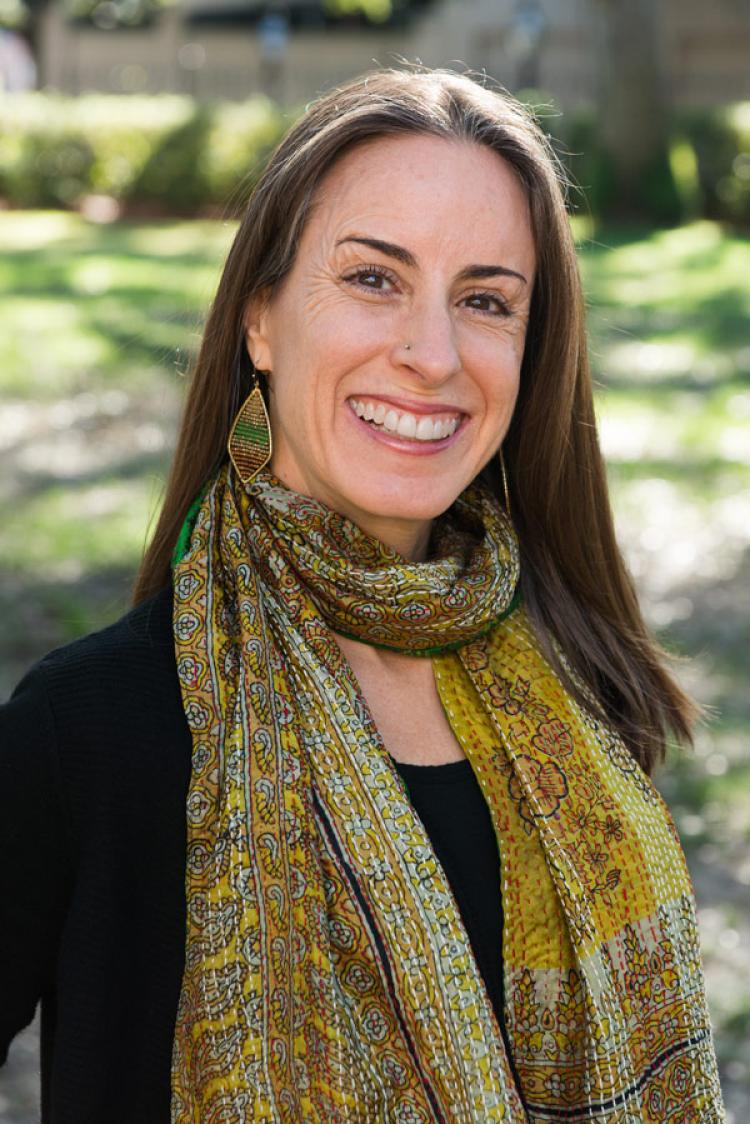Alumna Profile: Kris De Welde

Dr. Kris De Welde, Director of Women’s and Gender Studies and Professor at the College of Charleston, is an alumna of CU Boulder, receiving a bachelor’s in psychology (’98), a PhD in sociology (’03), and the Graduate Certificate in Women and Gender Studies (’02). She is the recipient of the 2019 College of Charleston ExCEL Award for Outstanding Faculty of the Year in the School of Humanities and Social Sciences, for her commitment to creating a campus environment that promotes diversity and excellence. De Welde also received the 2016-2017 Sociologists for Women in Society Feminist Activism Award for her sustained commitments to social justice within and beyond the academy. She has previously held faculty positions at Florida Gulf Coast University, Flagler College, and the University of Denver.
Dr. De Welde’s research interests include the study of intersectional inequalities and feminist leadership in higher education, reproductive justice, and the scholarship of teaching and learning. She is the co-author of the book Disrupting the Culture of Silence: Confronting Gender Inequality and Making Change in Higher Education (with Andi Stepnick, Stylus Publishing 2014), which was awarded the 2015 Outstanding Academic Title by Choice: Current Reviews for Academic Libraries.
As a student at CU Boulder, De Welde was awarded the 2002 Betsy Moen “Walk the Talk” Award, a campus-wide feminist award for commitment to feminist teaching, activism and scholarship. While in Boulder, she volunteered her time for several local agencies, including the Addiction Recovery Center, the Rape Crisis hotline, and the Teenwize and Streetwize women’s self-defense programs. De Welde’s interest in women’s self-defense is also seen in her dissertation, “Women Warriors Fight Back: Resistance and White Femininity in Self-Defense,” and numerous guest lectures she gave to multiple CU Sociology classes on violence against women, rape and self-defense.
De Welde will be a panelist at the annual meeting of the National Women’s Studies Association in San Francisco, at a session which she also helped organized: “Students at the Center of Feminist Leadership: The Praxis of Transformative Justice in Academic Settings.” She is currently working on projects regarding equity in women’s leadership roles in higher education, and an oral history of women’s reproductive choices. Despite her busy schedule, De Welde took the time to answer a few questions about her time at CU and how her work in women’s studies contributed to her career path.
How has the WGST Graduate Certificate contributed to your work?
"It might be easier to answer how the certificate, and the work I completed to earn the certificate, has not contributed to my work! The courses I took, the people I met, the additional books I read, and the faculty I worked with (and in some cases am still in contact with), have indelibly shaped my path. While I earned my PhD in Sociology, my teaching, research projects, activism, and mentoring of others are all imbued with intersectional feminist values, which I began to develop and hone while earning the certificate. I’ve held multiple jobs at several different institutions, and am now Director and full(!) Professor of Women’s and Gender Studies at the College of Charleston. I’m not ready yet to wrap up my career, but in many ways I’ve come full circle! And I continue to draw – sometimes quite literally – from what I was exposed to during my time with the WGST department while a grad student at Boulder."
What did you enjoy most from your time at CU?
"The luxury, which hardly seemed to be the case then, of dedicating myself full time to reading and writing and exploring ideas with peers and professors. There’s still a fair amount of that in my work now, but it is definitely not how I spend most days. I enjoyed being pushed, firmly but with support, to expand my perspectives and how I understand the world, while simultaneously cultivating my own voice as a scholar and as a feminist."
What advice do you have for students preparing for grad school?
"I wish I would have known how quickly it goes by. I would have been more mindful about the time I spent in grad school. I was a “non-traditional” graduate student, having completed my BA in my late twenties, and then jumping right into a PhD program. So, I felt that I was behind, that I needed to finish quickly, and get on with a career. I earned the PhD in five years despite conducting ethnographic field work for my dissertation. I’d like to think that I would have taken my time if I had a better sense of how arbitrary certain age-to-career-benchmarks are, which I certainly appreciate now!
I also suggest that early-stage graduate students choose their advisors wisely and replace them if you need to. First, one should have multiple advisors and mentors, not just the one formally designated “advisor.” It is critical to have a team of folx that you can go to and that each have different strengths. Second, advisors should help you be a better scholar, and should prepare you for the career you aim to craft, they should make you work hard. But, a good advisor also knows how to be a good human, knows when you need to claim your own ideas (and not just echo theirs), knows when you need to be nourished with support and care (even if they aren’t the ones providing it). Seek someone that respects you as a whole person. I know too many people that spent years putting pieces of themselves back together because of their advisor’s destructive “mentoring.” That was not my experience, but it is far too common."

